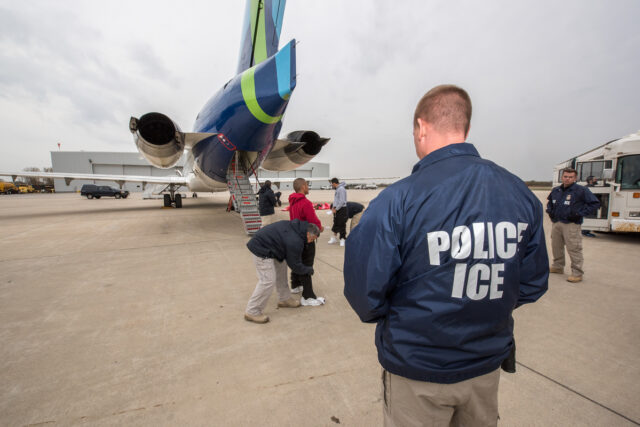Editor’s Note: Since this article was written, Venezuela has financed two planes to the US and picked up the first round of 200 deportees. Venezuelan President Nicolas Maduro said, “This is the world we want, a world of peace, understanding, dialogue and cooperation.” Stay tuned.
A week ago, Rep. Alexandria Ocasio-Cortez was bemoaning a future rise in coffee prices because of impending Trump administration tariffs on Colombia; it was very sad. Others worried that Mexico and Canada would drive the U.S. into poverty with retaliatory tariffs. Still others feared the U.S. would invade Greenland and fight Denmark for its 57,000 people while invading Panama to regain the canal. Others laughed at the idea that Venezuela and El Salvador would take back criminals they were happy to be rid of.
Deep breath. The tariffs were suspended before they were enacted.
After Mexican President Gloria Sheinbaum announced that the only reason the U.S. is prosperous is because of undocumented Mexican workers, Canadian Prime Minister Justin Trudeau considered the fact that 77% of Canada’s exports go to the U.S. while 17% of American exports go to Canada. Both leaders spoke with President Trump and agreed to his fundamental point. Our two allies and very good friends were failing in their obligation to defend their side of the U.S. border. Stopping the illegal movement of drugs and criminals requires cooperative operations. They announced new plans for border reinforcement.
The U.S., by the way, has a reciprocal obligation to Mexico. Ms. Sheinbaum reminded him that gun running to our south had taken on enormous volume. The U.S. also has to do better on our side of the border.
The furor that erupted with Mr. Trump’s announcement that convicted criminals facing deportation might be held in the U.S. base at Guantanamo Bay obscured President Clinton’s experience.
A University of Miami investigation notes, “From 1991 through July 1994, numbers of rafters rose steadily year by year until 500 were arriving daily during the first two weeks of July 1994. In August 1994, 32,385 Cubans were intercepted by the U.S. Coast Guard … and President Clinton refused them entry.” Sending them to, yes, Guantanamo.
Never mind.
Colombia, Venezuela and El Salvador agreed to take back illegal immigrants with convictions or warrants for their arrests. Salvadoran President Nayib Bukele said he would put them in the prisons in his country. Venezuela released six Americans it had been holding and agreed that members of the criminal gang Tren de Aragua could be repatriated.
Panama is the first country to leave China’s Belt and Road initiative. Questions remain about Chinese military personnel at the canal, which is a violation of the U.S.-Panama Treaty, but those will be discussed.
“Discuss” is the operative word here. The U.S. has an adversarial relationship with Venezuela, and Colombia has moved from being a friend to being less than that, but the other countries are our longtime friends. Canada, Mexico, El Salvador and Panama are partners in many ways.
Their evident disinterest in one of the primary concerns of the American people — border security — is not the attitude of a friend, ally or partner. Yes, there was more than a little blowhardness in the announcement of the tariffs, but getting their attention while showing the American people that the new administration is not the old one is key.
Then, there are people and organizations with which the U.S. should not be having a discussion.
The U.N. Human Rights Commission and the U.N. Relief Works Agency do not deserve American taxpayer money. The president has withdrawn from the first and cut off funding to the second.
The relationship between the U.N. Relief Works Agency and the U.S. Agency for International Development needs further investigation. Secretary of State Marco Rubio, acting director of USAID, said last week, “Every dollar we spend will be aligned with the national interest of the United States. USAID has a history of ignoring that and deciding that they’re a global charity. These are not donor dollars; these are taxpayer dollars. We owe the American people assurances that every dollar we are spending abroad is being spent on something that furthers our national interest.”
Good move.
Check the office of the USAID inspector general, complaining in January about the unwillingness of the United Nations to provide information about expenditures, noting that since Oct. 7, 2023, “The U.S. has provided over $1.2 billion in humanitarian assistance to the Palestinian people with at least $641 million of this aid programmed by USAID.” The inspector general’s office had identified Gaza as “high risk for potential diversion and misuse of U.S.-funded assistance,” noting that it is an “investigative priority to ensure that assistance does not fall into the hands of foreign terrorist organizations … including, but not limited to, Hamas.”
Oddly or not, this time our friends moved in support. Nearly three dozen officials from 14 European Union nations signed a letter accusing the U.N. Relief Works Agency of being compromised by Hamas after Emily Damari said she had been kept in U.N. facilities during her 15 months of captivity in Gaza. “UNRW has contravened all its missions and has helped a terrorist organization to hide hostages, which is politically, morally and legally highly reprehensible,” the lawmakers wrote.
There is more — a lot more — related to domestic and foreign policy. The important part here is not to blink, or you will miss the shift in America’s allies and adversaries going forward.


